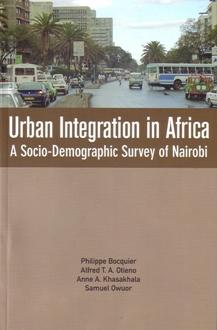Urban Integration in Africa: A Socio-Demographic Survey of Naïrobi
Mots-clés :
Africa, Integration, NaïrobiSynopsis
CODERIA, 2009, 207 p., ISBN : 078-2-86978-229-7
Nairobi is the main door to the East African market and a safe haven for most international firms and organizations, yet it nurtures so much poverty. Part of the explanation is embedded in the social history of today’s citizens of Nairobi. This book is based on the collection of almost 1600 biographies of men and women aged 25-54.
A team composed of researchers from the University of Nairobi and the French Institute for Research in Africa analysed how the Nairobi city-dwellers entered the labour market, had access to independent residence and form their families since the 1960s, and the factors that influence timing of these main paths to adulthood. The results show that men’s entry into adulthood is conditioned on employment, whereas women did not emancipate from their role of mother and spouse. Socio-cultural origins and migration status play a minor role in urban integration while education and gender are crucial. The formal economy declined since the 1980s, not as much to the benefit of informal enterprises as to the expense of the protection of employees. At the same time, youth unemployment increased while women’s labour force participation decreased.
The resulting poverty makes it harder for couples to form and sustain a family. This book is an important resource to sociologist, demographers, economists, urban planners and historians who want to know more about urban way of life in Africa.
Téléchargements






